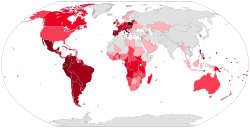The Catholic Church in Turkmenistan is part of the worldwide Catholic Church, under the spiritual leadership of the Pope in Rome.
| Part of a series on the |
| Catholic Church by country |
|---|
 |
| |
The Catholic Church in Turkmenistan is part of the worldwide Catholic Church, under the spiritual leadership of the Pope in Rome.
All Catholic infrastructure in the country was destroyed by Soviet revolutionaries in the 1920s. [1] In 1997 a request was made to recognize the local Catholic community, but was refused since the local church was not headed by a Turkmen. [1] In July 2010, the Catholic Mission received official government recognition and plans were started to both ask permission to build a Catholic church, and to reclaim a Catholic Armenian church in Turkmenbasy that still stands in the west of the country, as well as a church building in Sendar. [1] In the early 2000s, Mass was celebrated at the apostolic nunciature in the capital and at parishioners' homes. [2]
In 2020, there were 3 priests in the country, serving 300 Catholics in one parish. [3]